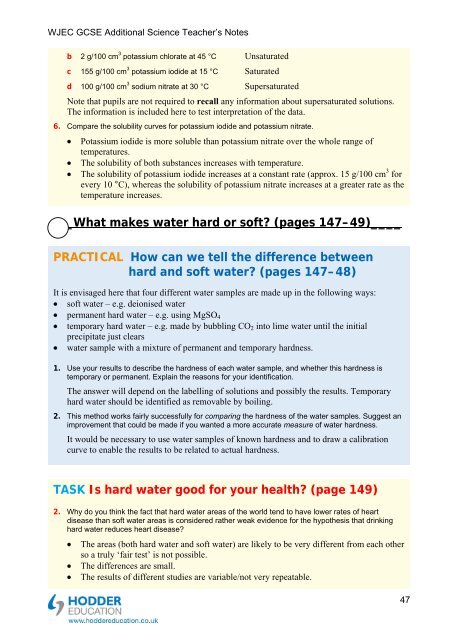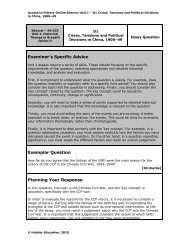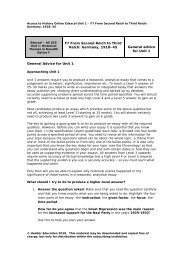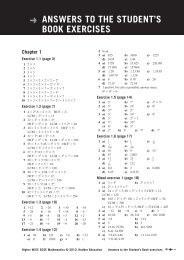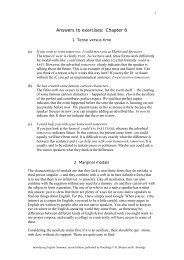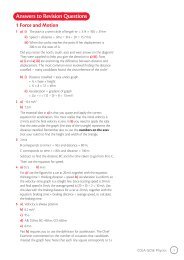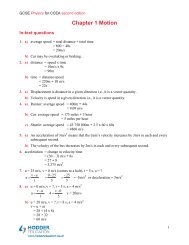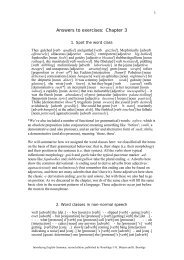Teacher's notes and answers to questions in the book - Hodder Plus ...
Teacher's notes and answers to questions in the book - Hodder Plus ...
Teacher's notes and answers to questions in the book - Hodder Plus ...
You also want an ePaper? Increase the reach of your titles
YUMPU automatically turns print PDFs into web optimized ePapers that Google loves.
WJEC GCSE Additional Science Teacher’s Notes<br />
b 2 g/100 cm 3 potassium chlorate at 45 °C<br />
Unsaturated<br />
c 155 g/100 cm 3 potassium iodide at 15 °C Saturated<br />
d 100 g/100 cm 3 sodium nitrate at 30 °C Supersaturated<br />
Note that pupils are not required <strong>to</strong> recall any <strong>in</strong>formation about supersaturated solutions.<br />
The <strong>in</strong>formation is <strong>in</strong>cluded here <strong>to</strong> test <strong>in</strong>terpretation of <strong>the</strong> data.<br />
6. Compare <strong>the</strong> solubility curves for potassium iodide <strong>and</strong> potassium nitrate.<br />
Potassium iodide is more soluble than potassium nitrate over <strong>the</strong> whole range of<br />
temperatures.<br />
The solubility of both substances <strong>in</strong>creases with temperature.<br />
The solubility of potassium iodide <strong>in</strong>creases at a constant rate (approx. 15 g/100 cm 3 for<br />
every 10 °C), whereas <strong>the</strong> solubility of potassium nitrate <strong>in</strong>creases at a greater rate as <strong>the</strong><br />
temperature <strong>in</strong>creases.<br />
_What makes water hard or soft (pages 147–49)____<br />
PRACTICAL How can we tell <strong>the</strong> difference between<br />
hard <strong>and</strong> soft water (pages 147–48)<br />
It is envisaged here that four different water samples are made up <strong>in</strong> <strong>the</strong> follow<strong>in</strong>g ways:<br />
soft water – e.g. deionised water<br />
permanent hard water – e.g. us<strong>in</strong>g MgSO 4<br />
temporary hard water – e.g. made by bubbl<strong>in</strong>g CO 2 <strong>in</strong><strong>to</strong> lime water until <strong>the</strong> <strong>in</strong>itial<br />
precipitate just clears<br />
water sample with a mixture of permanent <strong>and</strong> temporary hardness.<br />
1. Use your results <strong>to</strong> describe <strong>the</strong> hardness of each water sample, <strong>and</strong> whe<strong>the</strong>r this hardness is<br />
temporary or permanent. Expla<strong>in</strong> <strong>the</strong> reasons for your identification.<br />
The answer will depend on <strong>the</strong> labell<strong>in</strong>g of solutions <strong>and</strong> possibly <strong>the</strong> results. Temporary<br />
hard water should be identified as removable by boil<strong>in</strong>g.<br />
2. This method works fairly successfully for compar<strong>in</strong>g <strong>the</strong> hardness of <strong>the</strong> water samples. Suggest an<br />
improvement that could be made if you wanted a more accurate measure of water hardness.<br />
It would be necessary <strong>to</strong> use water samples of known hardness <strong>and</strong> <strong>to</strong> draw a calibration<br />
curve <strong>to</strong> enable <strong>the</strong> results <strong>to</strong> be related <strong>to</strong> actual hardness.<br />
TASK Is hard water good for your health (page 149)<br />
2. Why do you th<strong>in</strong>k <strong>the</strong> fact that hard water areas of <strong>the</strong> world tend <strong>to</strong> have lower rates of heart<br />
disease than soft water areas is considered ra<strong>the</strong>r weak evidence for <strong>the</strong> hypo<strong>the</strong>sis that dr<strong>in</strong>k<strong>in</strong>g<br />
hard water reduces heart disease<br />
<br />
<br />
<br />
The areas (both hard water <strong>and</strong> soft water) are likely <strong>to</strong> be very different from each o<strong>the</strong>r<br />
so a truly ‘fair test’ is not possible.<br />
The differences are small.<br />
The results of different studies are variable/not very repeatable.<br />
47


